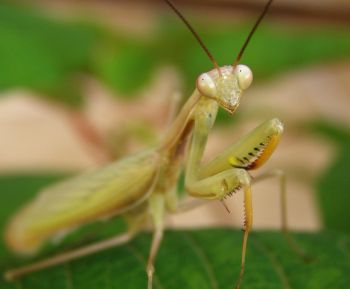Broadcast: News items
Sussex lecturers explain life, the universe and everything
By: James Hakner
Last updated: Wednesday, 10 February 2010

Praying or preying? Dr Peter Scott reveals the lives of insects such as this mantid at Brighton Science Festival
University of Sussex academics will be sharing their passion for science at the 2010 Brighton Science Festival, discoursing on life, the Universe and Sudoku.
Sussex is well represented in the Festival, which showcases science to the public in informative and entertaining ways.
University lecturers will be introducing audiences to the secret lives of insects and plants, the wonders of Space, hands-on experiments with protein, a play about carbon and showing how business can learn from the organisational skills of ants.
Events throughout the week include:
- Alien Beetles: Biologist Dr Peter Scott explains the life cycle of and answers questions on a range of special insects, including some of the weirdest of all, such as the giant Hercules beetle, at the Bright Sparks event during FAMILY FUN DAY, Saturday 13 February, at Hove Upper Park School, Nevill Road, Hove, from 10am to 5pm.
- Protein Pummelling: Dr Darren Thompson and fellow biochemists from the University will show visitors how find out which substance has more protein - cheese or shampoo - and offer the chance to play with all things protein-y in a hands-on protein-building workshop. FAMILY FUN DAY, Saturday 13 February, at Hove Upper Park School, Nevill Road, Hove, from 10am to 5pm.
- Do We Need Managers?: Professor Jonathan Bacon offers a thought-provoking breakfast lecture for business leaders when he draws on observations of bee and ant colonies, to examine how societies - from ants to humans - interact management-free. Includes breakfast and networking. Inspirational Breakfast with Sussex Enterprise, Tuesday 23 February from 7.30am to 10.00am, at Arora International, Gatwick, Southgate Avenue, Crawley
- Unweaving the rainbow: To mark the 20th anniversary of the launch of the Hubble Space Telescope, physicists share and explain breathtaking images of the cosmos, from the biggest bangs since the Big Bang, to the Big Bang itself. Speakers include Sussex scientists Dr Darren Baskill, Dr Kathy Romer, Dr Seb Oliver and Dr Andrew Liddle, who are the guides to images from the Hubble, Herschel and Planck space telescopes. Supported by the Institute of Physics. Wednesday 24 February at 7.30pm at the Sallis Benney Theatre, Grand Parade, Old Steine, Brighton
- The 300 Million Years War: Another chance to hear Professor Sue Hartley deliver highlights from her Royal Society Christmas lectures for children, which were televised on Channel 4 at the end of 2009. BIG SCIENCE SATURDAY, Saturday 27 February at 4.45pm at the Sallis Benney Theatre, Old Steine, Brighton
- Mathematical magic: Dr Istvan Kiss and a team from the department of Mathematics will be offering all kinds of maths therapy in between talks on Big Science Saturday. BIG SCIENCE SATURDAY, Saturday 27 February from 10am to 6pm, at the Sallis Benney Theatre, Old Steine, Brighton
- Elementary Carbon: Professor of Theoretical Chemistry Malcolm Heggie is the special guest star of a new piece entitled Elementary Carbon, devised by the critically-acclaimed company Organic Theatre. Saturday 27 February at 7pm at The Nightingale Theatre, 29-30 Surrey Street (above the pub), Brighton
- Life, the Universe and Everything: A full day on one theme - the common link between all living things. University speakers include Dr Blay Whitby (Lecturer in Computer Science and Artificial Intelligence); Dr Paul Graham of the University's Insect Navigation Group, and Professor of Apiculture Francis Ratnieks, who looks at the collective intelligence of ants and bees. Organised by Professor Jonathan Bacon. Sunday 28 February, 11am to 5.30pm at the Sallis Benney Theatre, Old Steine, Brighton.
Dr Scott, who is taking part in the Family Fun Day, says: "The Brighton Science Festival is an excellent place to get children and adults thinking about the world around them and why things do what they do, and to rekindle some of our lost enthusiasm for science."

